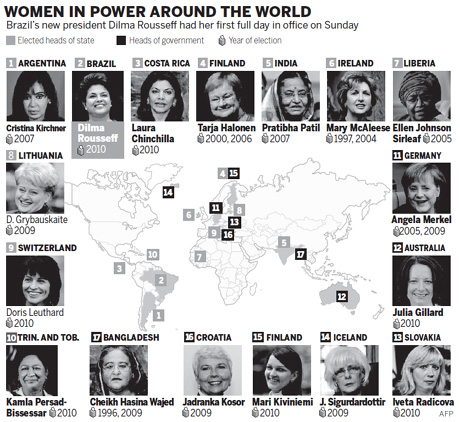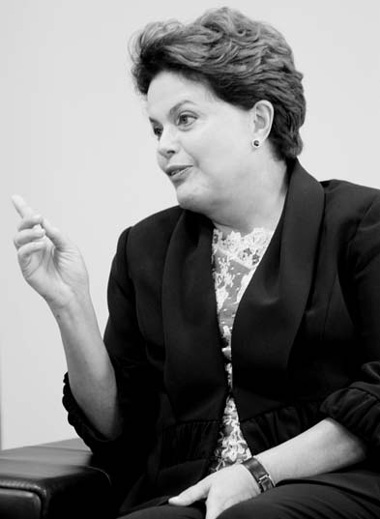Global General
A busy first day for Brazil's new president
By Yana Marull (China Daily)
Updated: 2011-01-04 08:10
 |
Large Medium Small |
|
Brazil's President Dilma Rousseff speaks during a meeting with Portugal's Prime Minister Jose Socrates at the Planalto presidential palace, in Brasilia, Brazil, on Sunday. Rousseff was sworn in as Brazil's first female president on Saturday. Eraldo Peres / Asspciated Press |
BRASILIA, Brazil - Brazil's new President Dilma Rousseff held a flurry of talks with foreign envoys on Sunday during her first full day in office after succeeding her hugely popular predecessor Luiz Inacio Lula da Silva.
The 63-year-old Rousseff, who was Lula's former cabinet chief, vowed during her inauguration on Saturday to continue his policies, which have fueled economic growth and enhanced Brazil's international standing.
On Sunday, Rousseff met with South Korean Prime Minister Kim Hwang-sik, Spain's crown Prince Felipe, Uruguayan President Jose Mujica, Cuban Vice-President Jose Ramon Machado and Palestinian President Mahmud Abbas.
The new Foreign Minister Antonio Patriota said her travel plans would take her to Brazil's two biggest trading partners, the United States and China, in the coming months as well as a February South America-Arab summit in Peru.
She was also expected to pursue closer ties with the BRICS club of major emerging economies, which besides Brazil includes Russia, India, China and South Africa.
During Saturday's inauguration ceremony, Rousseff received the green-and-gold official sash and a heartfelt hug from Lula before he left her alone in the spotlight to give her first speech to the nation.
"I will look after the most vulnerable. I will govern for all Brazilians," she said in the televised address from the palace's balcony.
Required to step down after serving the maximum two consecutive terms permitted under Brazil's constitution, Lula has not said what he plans to do in retirement.
But he has said he is a "natural born politician" who would not rule out trying to return to the presidency after Rousseff's four-year mandate ends, depending on the performance of the woman he helped get elected.
In her swearing-in speech before Brazil's Congress, Rousseff repeatedly paid homage to her mentor, calling him a "great man" and vowing to maintain his legacy, notably in reducing poverty and promoting economic prosperity.
"The most determined struggle will be to eradicate extreme poverty," she said. "We can be a more developed and fairer country."
Rousseff outlined plans for tax reforms, environmental protection, improved health services, regional development - and unspecified measures to combat foreign "speculation" that could upset Brazil's economic growth.
Brazil's economy grew an enviable 7.6 percent in 2010, it enjoys recently discovered oil finds that could make it a big-league exporter and it is preparing to host the 2014 football World Cup and 2016 Olympics.
But challenges loom. Growth is expected to slide to 4.5 percent in 2011, rising inflation is well above the government target at an estimated 5.9 percent, and an aim to cut public debt from 42 percent to 30 percent is likely to meet resistance, as Brazil desperately needs more and better infrastructure.
Agence France-Presse

